Ramadan
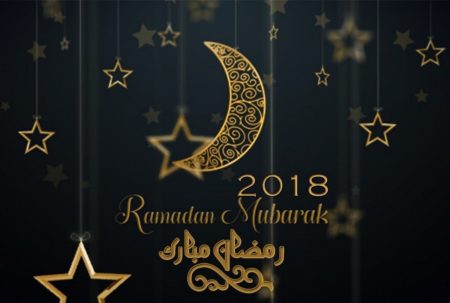
I experienced my first Holy Month of Ramadan – the fasting month. I did not personally fast, but I took the opportunity to learn about the world’s second largest religious group. My host family and counterpart were very receptive to my many questions about the changes I was seeing, and endeavored to explain concepts foreign to me. I will discuss some of the things I saw and learned, while realizing my education on this subject is just beginning.
Ramadan 2018 began on May 16 and ended June 15. It began on the first day of the ninth month of the Islamic Calendar, which is based off the lunar calendar, and the starting date is determined by the sighting of the crescent moon. During Ramadan, Muslims fast (the fourth pillar of Islam) from sun-up to sun-down daily, and do not eat, drink, smoke or indulge in sexual relations during that time.
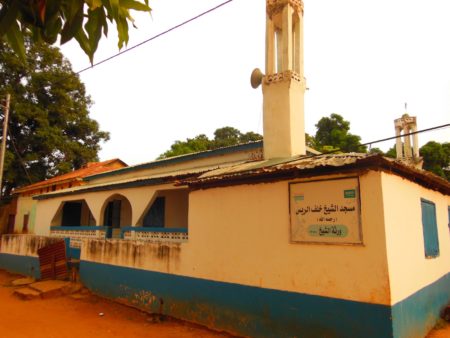
The five pillars of Islam are:
- Profession of Faith and the Oneness of God. “There is no God but God and Muhammad is his prophet.” The significance of this declaration is the belief that the only purpose of life is to serve and obey God.
- Daily Prayers kneeling toward Mecca. Prayers are performed five times a day: at dawn, mid-day, late-afternoon, sunset and nightfall. There is no hierarchical authority in Islam and there are no priests. Prayers are led by a learned person who knows the Quran.
- Charity or almsgiving. A principle of Islam is that everything belongs to God, and that wealth is therefore held by human beings in trust. Like the pruning of plants, this cutting back balances and encourages new growth.
- Fasting during Ramadan. It is a month to instill self-discipline, self-control, sacrifice, and empathy. A fasting person focuses on his or her purpose in life by constantly being aware of the presence of God.
- Pilgrimage to Mecca. All Muslims who are able are required to make the pilgrimage to Mecca and the surrounding holy sites at least once in their lives. Pilgrimage focuses on visiting the Kaaba and walking around it seven times. Pilgrimage occurs in the 12th month of the Islamic Calendar.
The month of Ramadan holds special significance in the lives of Muslims as it was during this month, that the Quran was first revealed to the Prophet Muhammad. According to believers, prayers rendered in this month are truly blessed by Allah, reaching the doors of heaven directly, while the doors of hell remain closed, behind which the devil stays chained. Believers celebrate the Quran during Ramadan by reading the entire book at least once, and some people will read it multiple times.
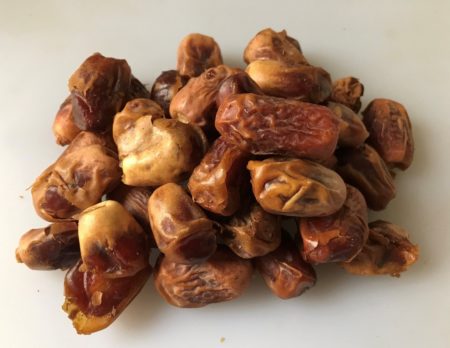
Each day during Ramadan families rise before dawn and have a pre-fast meal called Suhur. All adults and youth that have entered puberty, are obliged to fast with the exception of pregnant or breastfeeding women, the sick or mentally challenged, or during travel if it will cause a hardship. It is expected that a person who is exempt from fasting during Ramadan will make up the missed days at a future time. If a Muslim keeps the fast during Ramadan, their sins committed during the previous year are forgiven. At sunset, families gather to break the fast with a meal called Iftar. They usually break their fast with dates and water, before attending the fourth of the five daily prayers. Dates are an Iftar tradition because the Prophet Muhammad broke his fast with three dates and water.
Since The Gambia is 90% Muslim, schedules are adjusted country wide to accommodate the fact that most people are fasting. I noticed many changes, some were subtle and others were incorporated into daily life. The morning call to prayer over the Mosque loudspeakers began earlier and each of the five daily prayer times had longer broadcasts. My family was extra busy all morning getting their chores done, so they were able to rest and nap during the heat of the day.
One example of a scheduling adjustment, was at the permagarden workshop, which was less than a week into Ramadan. The meal times were adjusted because more than two thirds of the participants were fasting. Those of us who were not fasting were served lunch at 2pm and we had our breakfast at 7am, but the people who were fasting got up at 4am to eat their breakfast before dawn. There were two evening meals, one to break the fast at sun-down and another after the final evening prayer. The first evening meal usually had some type of meat, vegetables and bread. The final meal of the day at 9:30pm always included rice, because most Gambians don’t feel their dinner is complete without rice.
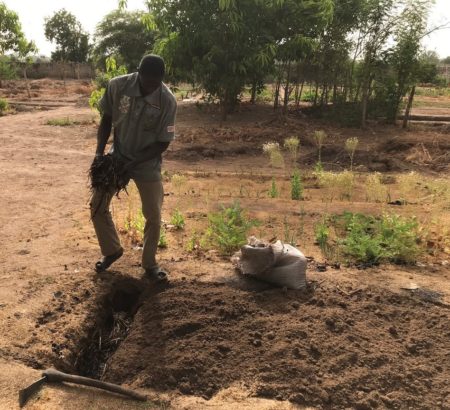
The majority of the physical labor was performed in the morning, when it was cooler and everyone had more energy. I was in awe of the fasters who went all day without eating or drinking during 100+ degree days. There is also a lot of spitting, because people do not want to swallow anything while they are fasting. My counterpart, who is usually a high energy person, became noticeably tired by late afternoon. I never heard him complained, because he believes that performing the Ramadan rituals is a blessing worth missing food, drink and sleep for. Also, the merchants in the market place, which is normally still busy in the late afternoon, were becoming lethargic. Many stalls closed earlier than usual, so the women could return home and prepare the Iftar meal.
The last ten days of Ramadan are particularly significant and many will add an additional ritual. They will attend service at the Mosque from midnight to 4am for prayers, sermons and recitations of the Quran. The last ten days are considered a time to perfect one’s fast, to give more to charity, settle disputes, and forgive one another. It is also a time for soul searching, evaluating one’s life, supplicating, and asking forgiveness. Its amazing anything it get done at all during this time, with the prolonged fast and lack of sleep.
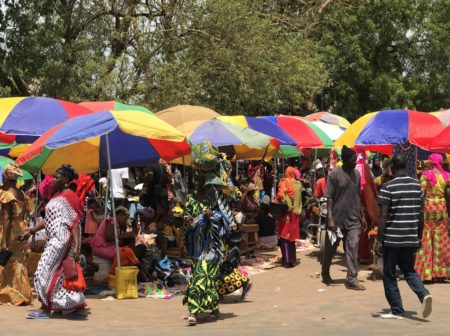
The 27th night of Ramadan is called Laylat Al Qadr and is considered the holiest night of the year for Muslims. It is known as the “Night of Power,” and commemorates the night that the Quran was first revealed to the Prophet Muhammad. Many people celebrated all night long listening to music and visiting with friends after attending special services at the Mosque. Again, I was grateful that my family was available to answer questions about why there was partying during that night.
Preparations for the end of Ramadan is all about celebrations. Everyone gets new clothes, houses are thoroughly cleaned, and special meals are being planned. The marketplace becomes a crowded street fair, selling many small gifts and special foods. I was surprised on the morning after Laylat Al Qadr when I headed to work on my bike, and was unable to get through the pop-up stalls blocking the road I normally use. I needed to take an alternate route to work for the next three days. After work I had fun visiting all the new stalls, and purchased a couple of beaded bracelets to remember my first Ramadan.
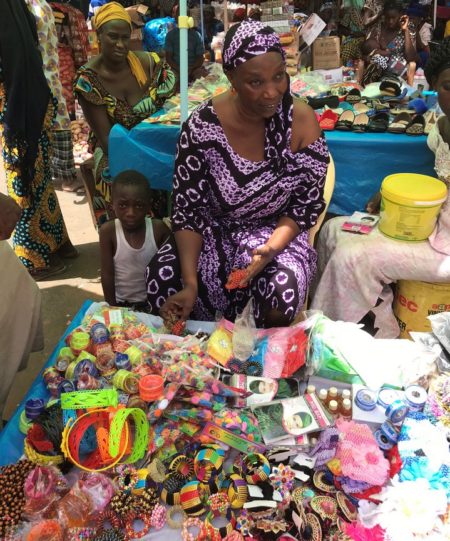
Friday June 15 was Eid Al-Fitr, the end of Ramadan 2018, and was celebrated with the one-day festival known Koriteh, which translates to mean the feast after the fast. In the morning everyone put on their new clothes and my host mom, Fatou Dibba, graciously lent me clothes so I was dressed appropriately to accompany them to the service outside the Mosque. All the women and children sat together on mats under a huge Baobab tree. The Eid prayers should be performed in an open field or area if possible. It is not recommended to conduct Eid prayers in every single mosque. It is said to be a time for Muslims to celebrate Eid together in large gatherings. The Eid prayer is distinct from other Muslim prayers.
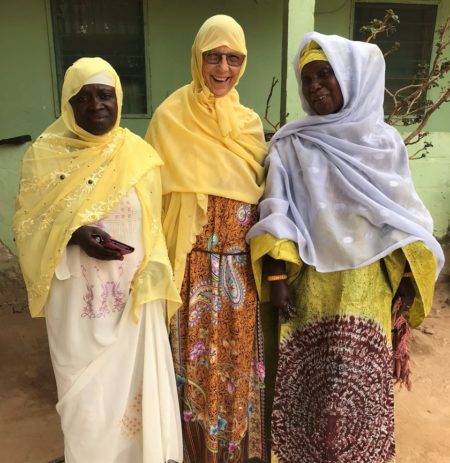
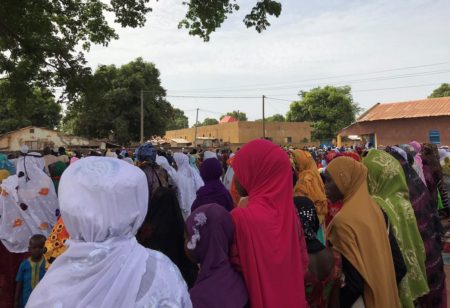
This is a description of the service I attended: “The Imam will lead the salat (prayers) and there will be six sets of takbirs (Allah Akbar). Three of the takbirs will be in the beginning of the salat. After each takbir, the hands are raised to the ears. At the beginning of the second rakat, after the Imam recites the Fatiha and something from the Quran, an additional three takbirs are recited.”
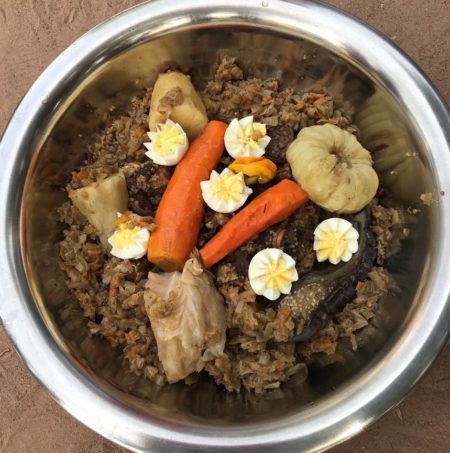
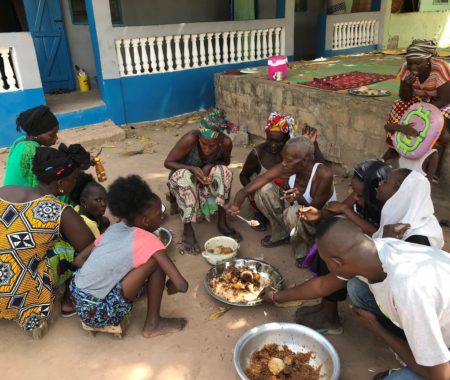
After the service we visited with friends on our walk home, saying prayers for peace, good health and luck during the coming year, and asking for forgiveness for any sins committed. When we arrived at our compound, most of the adults changed out of our fancy new clothes, and the women began to prepare our food bowls for the communal feast. There are three family units living in my compound, and we usually eat our meals separately. I always enjoy the times we join together to share our food bowls, and I was given the honor of a low stool to sit upon. It is customary to move around and eat a little from each bowl, and neighbors will stop by to partake of this special meal with us. The rest of the day was for relaxing, visiting with friends, and sharing treats to celebrate Eid Al-Fitr.
I am indebted to my family for including me in the festivities, and I look forward to Ramadan next year, because I missed some opportunities to fully participate. I didn’t know about bringing money to the morning service outside the Mosque, where the less fortunate went around collecting alms. I did know about the tradition of Salibo, giving sweets or money to children. I had bought a bag of candy and saved a lot of one dalasi coins (about 2 cents) to be prepared. It was fun to interact with the children still dressed in their best clothes, who were going around exchanging prayers for dalasis or sweets.
Link to Peace Corps Ramadan video on Instagram
2 thoughts on “Ramadan”
Fascinating report, Susan. We all learn something by following this blog. Keep writing.
Thanks for sharing you Ramadan experience.
Comments are closed.